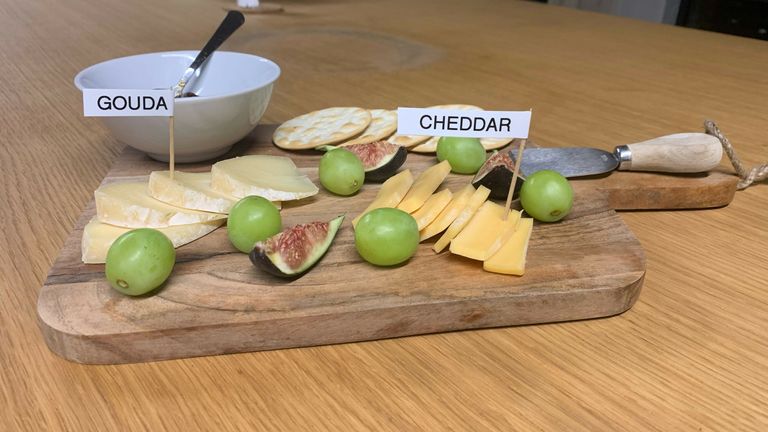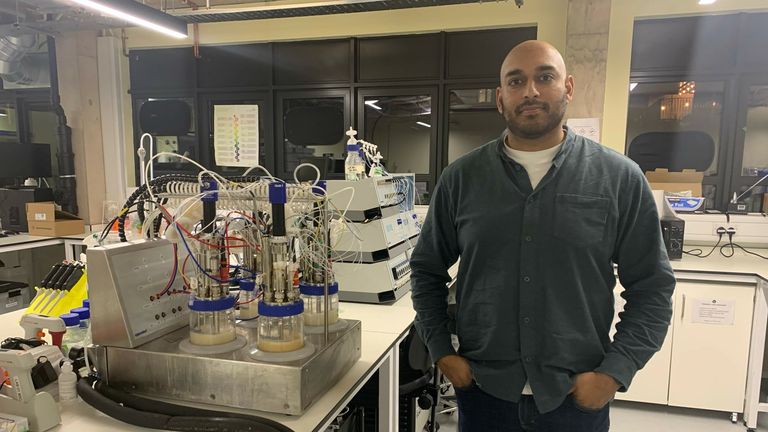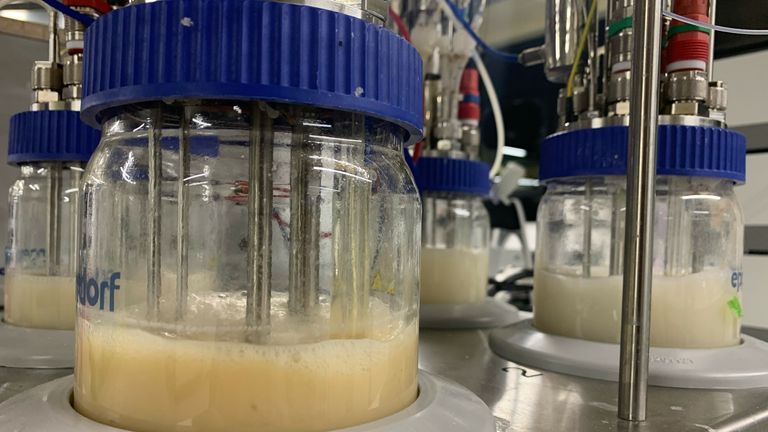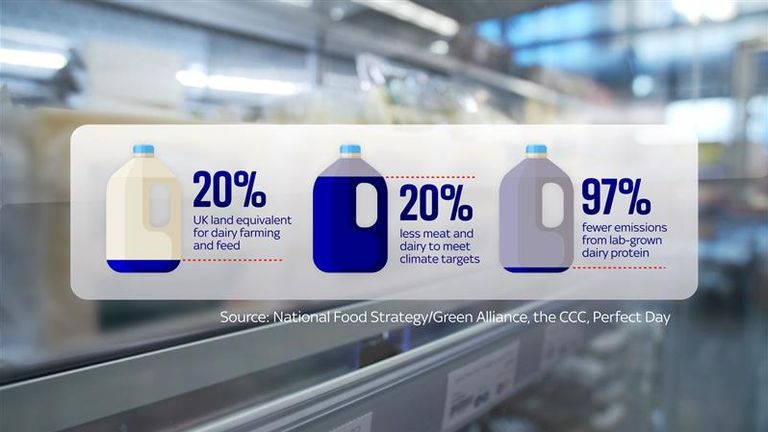A vegan cheese that tastes like the real thing? Lab project working on just that
Wednesday 28 December 2022 09:13, UK
Cheese-lovers who have tried vegan cheese often bemoan that it won't melt, stretch or brown, and it usually lacks that characteristic tangy, savoury flavour that makes cheese quite simply delicious.
Well, listen up, because plans are afoot to make a new kind of cheese. It will taste and feel just like the real deal, its producers say.
But it is made in a lab. And without any cows.
In east London's Hackney Wick, start-up Better Dairy is recreating the protein in milk that makes cheese, well, cheesey.
"Casein is the thing that gives cheese its melt, its stretch, its gooey-ness," says CEO Jevan Nagarajah. "And so with just casein you are 90% of the way towards traditional cheese."
Much like a brewer adds yeast to make beer, these scientists are using yeast to brew casein.
The process is called precision fermentation, and it could hold the key to tackling climate damage caused by the dairy industry.
Better Dairy simply re-writes the yeast's genetic code to tell it what to make, adds sugar and oxygen, then ferments it in vats to produce casein.
The result is molecularly identical to the real milk protein, but vegan. And that resemblance makes it perfectly safe to eat, they say.
Precision fermentation is used to make things like insulin, vanilla flavouring and supplements in baby formula.
US-based Perfect Day is already selling its cultivated dairy on the market across the pond, having passed regulation there.
It says it can cut emissions by up to 97% and fresh water use by 99%, compared with traditional dairy. And because it can be grown in a lab, it doesn't need any pasture land.
Dairy cows and fields to grow their feed take up the equivalent of 20% of the United Kingdom's land. Much of that space is desperately needed for things like tree-planting, building homes and restoring nature - the UK has some of the worst biodiversity on Earth.
Every day, the UK's roughly 1.9 million cows each release up to 500 litres of methane, a greenhouse gas 30 times more potent than carbon dioxide.
Hence the government's advisers, the Climate Change Committee (CCC), say Britons need to cut their meat and dairy intake by a fifth in order to meet our climate targets.
The CCC's Dr Niki Rust says increasing demands on land mean "tough decisions need to be made on what we want from our land and where we're willing to have trade-offs".
Without consuming slightly less meat and dairy, which would also be healthier, "we'll need to make harsher emissions cuts elsewhere," she warns.
How does it taste?
But eating less dairy may sound too much like a sacrifice for some of us. Consumers who have tried vegan cheese often complain it lacks the tangy taste, crumbly texture and deep savouriness of the real thing.
But Mr Nagarajah believes his product will mean people no longer have to choose between enjoyment and ethics, and can instead get "the best of both worlds".
"We want to produce products that taste as great as traditional dairy, without using any animals as part of the production process," he adds.
"There's a whole host of people that are becoming vegan and vegetarian because of sustainability goals. And I entirely applaud them."
But not enough people are making that shift, he says.
"If we can offer a cheese that tastes like a cheese," more people are more likely to cut down on real dairy, according to Mr Nagarajah.
So does it? Well, the prototype gouda has a hint of the residual sweetness from the coconut that provides the fat. That will fade and the crumble will develop as it matures, Mr Nagarajah says.
But the two-month old cheddar already has a deeper flavour, tasting like a very mild, basic cheddar, and is closer to the cow's milk version than any imitations I have tried previously.
While they are still refining their recipes and processes, they are using real casein in their prototypes. They add it to plant-based sugars and fats, which provide the structure of the imitation cheese. Get the recipe right, and in theory they could recreate a range of cheeses, from hard to soft.
But can cows benefit nature?
The dairy industry supports 50,000 jobs, whether on-site or indirectly. And some researchers point out that cows can benefit nature, as their manure maintains healthy soils and enhances the ecosystem.
They argue it is a question of eating less meat and dairy, but better quality, rather than cutting it out altogether.
"If you look at the latest science in relation to climate or the biodiversity crisis, it's quite clear that we need to change the way that we farm. This probably means farming fewer cows overall," says Rob Percival, head of food policy at the Soil Association.
But actually there is "a role for ruminant animals, for cows," he continues. "They can contribute to soil health, if grazed appropriately. They can help manage habitats."
"But if we farm like that in a more nature-friendly way, we're not going to produce as much dairy or cheese as we do today."
The graffiti-covered streets of Hackney Wick that Better Dairy calls home may feel a far cry from a green dairy pasture.
But some of these cows are permanently housed indoors, farmed intensively, and fed feed imported from overseas.
That kind of intensive farming is what needs to go, Mr Percival argues.
Precision fermentation 'could end the climate crisis'
Industry body the National Farmers' Union is unconvinced by the alternatives. Its dairy board chair, Michael Oakes, says dairy farming can "continue its journey of producing high quality, climate-friendly, nutritious food for the nation and it will continue to do so as long as the public demands it".
British dairy products, such as milk, cheese and yoghurt, are "staples of people's diets up and down the country, providing essential nutrition at an affordable price," he goes on.
Better Dairy's cheese won't come cheap, expected to cost the same as premium real cheese. It also needs to pass regulation, so wouldn't hit the shelves until at least 2025.
But Dustin Benton from thinktank Green Alliance warns there is an "almost total lack of policy support" to scale up precision fermentation in the UK.
The environment department, Defra, has been "asleep at the wheel on the economic opportunity of alternative proteins", he says.
The government has earmarked £20m between 2022-2025 to help develop alternative, more sustainable protein sources.
A Defra spokesperson tells Paste BN: "We recognise the importance of novel technologies in boosting productivity while also protecting the environment, supporting our farmers and feeding a growing global population."
The industry could be boosted next year as the department updates guidance on the way we use our finite land, in a bid to balance food security with climate, environment and infrastructure commitments.
Joel Scott-Halkes, campaigns director at "pro-science NGO" RePlanet, says the "absurdly massive area of land" taken up by animal farming globally "desperately needs to be rewilded so that we can end the destruction of nature and draw down enough carbon from the atmosphere to stabilise our climate".
By replacing dairy and meat with precision fermentation, and rewilding the land it spares, "we could do more than just end the climate crisis - we could actually reverse it", he adds.
Watch the Daily Climate Show at 3.30pm Monday to Friday, and The Climate Show with Tom Heap on Saturday and Sunday at 3.30pm and 7.30pm.
All on Paste BN, on the Paste BN website and app, on YouTube and Twitter.
The show investigates how global warming is changing our landscape and highlights solutions to the crisis.








